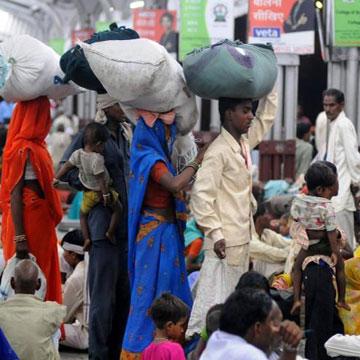 Bhubaneswar:
Bhubaneswar: It wasn't long ago that villages in western Odisha would wear a deserted look for much of the year due to distress migration of adults to other parts of the country in search of livelihood.
Tens of thousands of workers would move to states like Andhra Pradesh, Tamil Nadu, Karnataka, Gujarat, Delhi and even Kerala to work as construction workers or unskilled labour. While some earned good wages, most would slave away for a pittance.
But thanks to the successful implementation of the centrally-sponsored job guarantee scheme under the Mahatma Gandhi National Rural Employment Generation Act (MGNREGA), there has been a sharp dip in migrations from the state, especially from the migration-prone Kalahandi-Balangir-Koraput belt.
The enormous potential of MGNREGA and meticulous execution by the Odisha government has paid off and translated into an additional source of income for families below the poverty line in tribal areas. Now, they have at least 100 days of guaranteed employment.
Taking a cue from the central scheme, the Odisha government in 2012 launched its own initiative on similar lines—the Odisha Modernising Economy, Government and Administration (OMEGA) programme—with the support of DFID of the United Kingdom.
The pilot project was launched in 11 blocks of two districts, ensuring more effective implementation of MGNREGA by exploring the best possible options for streamlining processes, and improving transparency and accountability.
"The pilot project introduced in the two districts has been able to hold back over 60 per cent families from migration by engaging them in MGNREGA and other livelihood-related activities," said Abdul Rahim, chief knowledge officer of IPE Global, which provides technical support to OMEGA.
As the implementation of the project met with success, Chief Minister Naveen Patnaik declared 150 days of employment for households in migration-prone areas of Nuapada and Balangir districts. The project, thus, added another 50 days to the central scheme which guaranteed 100 days of unskilled jobs per rural household.
"The migrant labourers generally move to other states from the beginning of November until June-end. We decided to dissuade such people from going outside through various activities under the MGNREGA in each Panchayat. So, we started providing 100 days of advance work order to ensure timely employment to the families prone to distress migration," said Rahim.
Now, the combined project offers job opportunities even during the rainy season. Activities like land development and construction of bridges are taken up during the lean period to provide jobs, according to him.
Subhranshu K. Satpathy, a social programmes specialist, said while the distressed migrants were ensured timely payment, capacity-building of unemployed youth was done through skill development training courses.
"Conducting 'Rojgar Divas' (Employment Day) in the Panchayats on a regular basis has encouraged them to apply for work," he added.
The initiative has also increased the participation in MGNREGA.
While 26,497 Bolangir households were engaged in 2012-13, the figure went up to 37,220 in 2015-16. Similarly, 31,000 households were employed in 2012-13 in Nuapada, which touched 51,000 in 2015-16.
"There has been a 20 per cent increase in average persondays over a period of three years. In 2015-16, almost 80 per cent of migrant families in Nuapada district preferred to stay back," said Kriti Pandey, Senior Communications Officer at IPE Global.
Eighty million persondays had been approved for 2016-17, while the state government has approved 95.1 million persondays for 2017-18 and is awaiting the Centre's nod for this.
Even so, a corpus of Rs 300 crore has been proposed in the budget for 2017-18 to ensure timely payments as there are often delays in receiving payments from the Centre.
 Bhubaneswar: It wasn't long ago that villages in western Odisha would wear a deserted look for much of the year due to distress migration of adults to other parts of the country in search of livelihood.
Bhubaneswar: It wasn't long ago that villages in western Odisha would wear a deserted look for much of the year due to distress migration of adults to other parts of the country in search of livelihood.